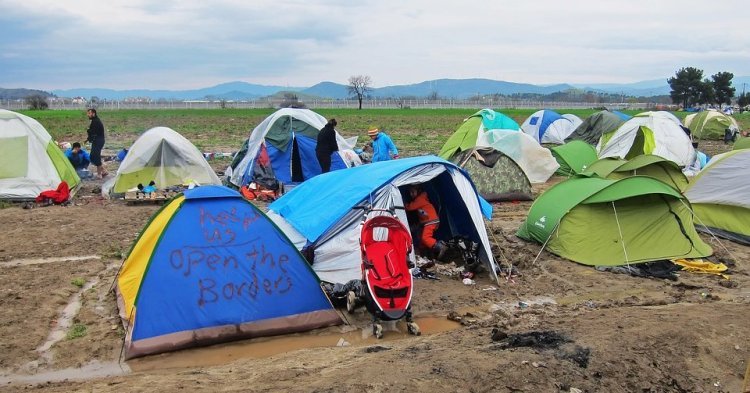The numbers behind migration
“Migrants are on the assault on Europe!” a young MEP representing the French far-right group Rassemblement National (formerly Front National) recently declared in the European Parliament. The issue of figures is important, as they are sometimes manipulated and even purely made up. Of the 512.4 million people living in the EU, as of 1st January 2018, 4.4% were immigrants from developing countries. In total, EU Member States granted nationality to 825,000 people in 2017. We are a long way from an ‘assault on Europe’. These figures show international migration into Europe. If we look at France specifically, for example, in 2017, more than a third of its immigrants came from another European country (35% or 92,000 people) which is almost equal to those coming from Africa (36% or 96,000 people).
Le Monde states that, on a European level, “the peak of the migration crisis was actually in 2015 and 2016, due to the huge numbers of people fleeing Syria. We counted 1.2 million people a year attempting to seek asylum in the European Union”. After this peak in 2015-16, the number of asylum seekers has largely decreased in the EU.
So if there is no statistical basis to the ‘migration invasion’ idea, why is it so widespread?
False ideas around the migration debate are fed both by the expected increase in the African population in the decades to come, and the current migrant ‘crisis’ in Europe. François Héran, head of ‘Migration and Societies’ at the Collège de France, and statistician at the National Institute of Statistic and Economic Studies (INSEE) in Paris is categorical on the matter: the invasion of Europe by migrants is nothing but an illusion.
“Sub-Saharan Africans, who currently represent 1% of the European population, will represent, at most 3% to 4% of the population of northern Europe in 2050”, says François Héran in the article ‘Europe and the ghost of migrants’ published in the journal of National Institute of Demographic Studies.
Migration, an issue of political strategy and media?
Political parties have the ability to influence the political agenda as long as they have easy access to the media, as that enables them to provoke controversy and court public opinion. This can also be a strategical necessity so that potential voters are able to differentiate between the parties’ proposals and identities. The role of the media and ‘politics’ in the creation of an exaggerated discourse on migration is a large one, whether for electoral reasons or because dramatic and sensationalised stories capture the media’s and society’s attention.
Nil volentibus arduum - nothing is impossible for those willing. If we take the example of the French party Front National in the 1980s, immigration and unemployment were on the political agenda. Since the political renewal of the party, begun in 2012, Marine le Pen has been working to make the discourse shift towards Islamification, through which, secularism and immigration are finding themselves back at the forefront of the political scene. The media can also provoke controversy, for strategic editorial and economic reasons, even without any particular social need for it. Controversy which generally forces political parties and those in charge to take a stance on certain issues. The coverage of the topic of migration is for that reason at maximum and therefore, immigration and the threat of invasion by the ‘other’ in Europe can impose itself into the media and political sphere.
A question of European disarray or European unity?
As with other issues, the refugee ‘question’ entails a global response, at the very least involving coordinated action by the EU member states. Some action is being taken by Europe on the matter, for example an organised response to receive and relocate migrants, as well as legal procedures against countries which are reluctant about the idea of ‘relocation’ – as just one example. Let us also recall the fact that the European border agency, Frontex, will be provided with 10,000 staff members in 2027 in order to better protect Europe’s borders and facilitate the deportation of those identified as illegal immigrants.
However, in reality the countries involved are always the same. Spain, Italy and Greece are consistently the first countries reached by migrants, whilst France, Italy and Germany are the top spots for relocation. We are still far from a coordinated solution with all 27 countries and it provides an opportunity to point fingers at ‘Europe’ and to continue to regurgitate the migration question in the political media sphere. Between political calculations, problems with the speed of administration, questions of sovereignty and the lack of agreement on whether to welcome the ‘other’, we have seen the situation end up in the current chaos. We all have in our minds the latest tragedy: the violent clashes on the Turkish-Greek border between the police and migrants.
It seems that two camps oppose one another on the question of migration. On the one hand we can see a discourse which is in favour of immigration, as it is seen as a stimulus for an ageing Europe.
Symbolic of the division in opinion on the opportunities that migration brings for Europe: France, at the moment, is identifying the industries that need more workers. These differences in opinion concerning the positive impact on welcoming migrants, and the weight of each of the groups in favour and against the obligation to ‘welcome’, suggest that if a solution is to be found, it won’t emerge any time soon. However, in the meantime, the subject of migration remains in the media’s eye, and the dissemination of all types of information is encouraged, some of it true, and some very much false.

Follow the comments: |
|
